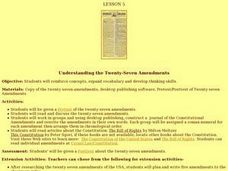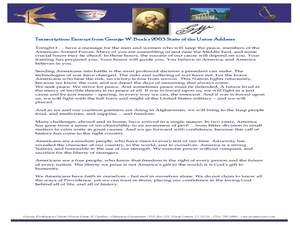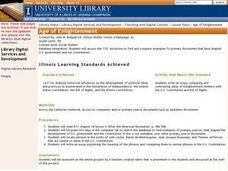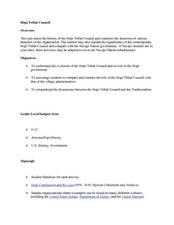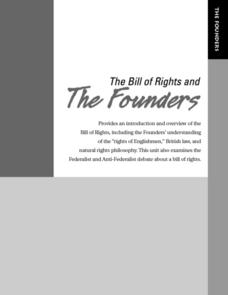Curated OER
Understanding the Twenty-Seven Amendments
Students use the Internet to learn about the Constitution. In this Constitutional Amendments instructional activity, students read and discuss the twenty seven amendments and work in groups to rewrite the amendments in their own words. ...
Curated OER
1930 Census and the Consitution
Students read the Constitution and discuss the importance of enumeration. In this Census instructional activity, students complete a Census schedule and discuss the job skills of applicants. Students research Census data to compare and...
Curated OER
The 1808 Slave Trade Abolition Deadline
Students study the trans-Atlantic Slave trade. In this slave trade activity, students study the Constitutional Convention Notes and the impact on United States slavery. Students research the slave trade database and other primary sources...
Curated OER
George Washington's Foreign Policy
Learners compare George Washington's foreign policy to the policies of presidents who followed him. In this primary source analysis lesson, students compare Washington's Farewell Address to the Roosevelt Corollary, the Monroe Doctrine,...
Curated OER
George Washington - A Graphic Novel
Students write and illustrate their own graphic novels. In this George Washington instructional activity, students collaborate to research Washington's life as surveyor, his involvement in the French and Indian War as well as the...
Curated OER
Age of Enlightenment
Studnets compare example of primary documents that have shaped U.S. government and our Constitution.
Curated OER
Lesson Plan for Reading
Students in an adult ESL classroom are introduced to the definition of freedom of speech. Using the internet, they discover the differences between the rule of law and rule of men. To end the lesson, they examine how the court system...
Curated OER
Bill of Rights and Lawmaking
Ninth graders consider how the Bill of Rights impacts the lawmaking process in the United States. In this Bill of Rights lesson, 9th graders discuss the amendments and their limitations. Students research the role of the Legislative...
Curated OER
The Constitution
Students use both electronic and traditional resources to research information about U.S. Constitution, answer questions pertaining to Congress and the Presidency, and design HyperStudio presentation to display answers to research...
Curated OER
Write a Constitution
Fourth graders examine the United states Constitution and discuss the difficulties the framers faced in writing it. They explore ideas about the division of power, rights, and other topics contained in it.
Curated OER
Constitution Day: The 1965 Alabama Literacy Test
Tenth graders examine the United States Constitution. In this American Government instructional activity, 10th graders read excerpts from President Johnson's speech to Congress and parts of the Voting Rights Act of 1965. ...
Curated OER
Writing a Class Constitution
Students view a short play and explore the United States constitution relating it to the importance of rules in the classroom and in the community.
Curated OER
Constitution Day
Students discuss the need for rules in their community and classroom. Using this information, they identify the authority figures at their house, at school and in the community. They are read a book about following the rules and listen...
Curated OER
U.S. Constitution: KWL
In this United States Constitution instructional activity, students complete the what I know, what I want to know, and what I have learned chart with information about the U.S. Constitution.
Curated OER
What is Due Process Anyway?
Students examine the term due process and its historical origins. They compare and constrast the requirements of due process in the United States Constitution and the Indiana Constitution. They also discuss the difference between...
Curated OER
The Changing Meaning of "Due Process"
Students examine the United States Constitution and how the application for due process differs in two amendments. They research the changing definition of the term since the Civil War. They use the internet to research press coverage of...
Curated OER
Hopi Tribal Council
Focusing on the differences between traditional Hopi government and the Hopi Tribal Council, this resource is a good addition to your unit on Native American culture. Learners conduct Internet research, analyze primary source photos, and...
Stanford University
Civil Rights or Human Rights?
Young citizens consider the American civil rights movement as part of the global struggle for human rights. After using a timeline activity to learn about the major events in the civil rights movement, class members study Malcolm X's...
Curated OER
What Are Our Common Values?
Students make a poster. In this values instructional activity, students read the Preamble to the Constitution and discuss the core democratic values that are found there and in the Declaration of Independence. Students are each...
Curated OER
Naturalized Citizens and the Presidency
Students consider the presidential requirements. In this U.S. Constitution lesson, students participate in a role play that requires them to act as senators and debate an amendment to allow naturalized citizens to run for the presidency.
Curated OER
Letters to the Government
Seventh graders examine how to be active participants in their local, state, or federal governments. They create a powerpoint presentation and write a letter to one of their governmental representatives about a problem and solution of...
Curated OER
The Bill of Rights and the Founders
Young scholars explain similarities between historical statements of rights and their modern applications, explore ideas of "Rights of Englishmen" and natural rights, discuss evolution of concept of rights and its impact on Bill of...
Curated OER
Scopes Trial Activity
Young scholars are able to prepare arguments for a moot court case. They know how the Scopes Trial impacts academic freedom today. Students know what constitutional amendments are applicable to this issue (including the Butler Act). ...
Curated OER
How a Bill Becomes a Law
Students examine Article I, Sections 1, 7, and 8, of the U.S. Constitution and discuss the authority and restrictions placed on the Congress in making laws.
Other popular searches
- United States Constitution
- United Statesusus Constitution
- The United States Constitution
- Unites States Constitution


